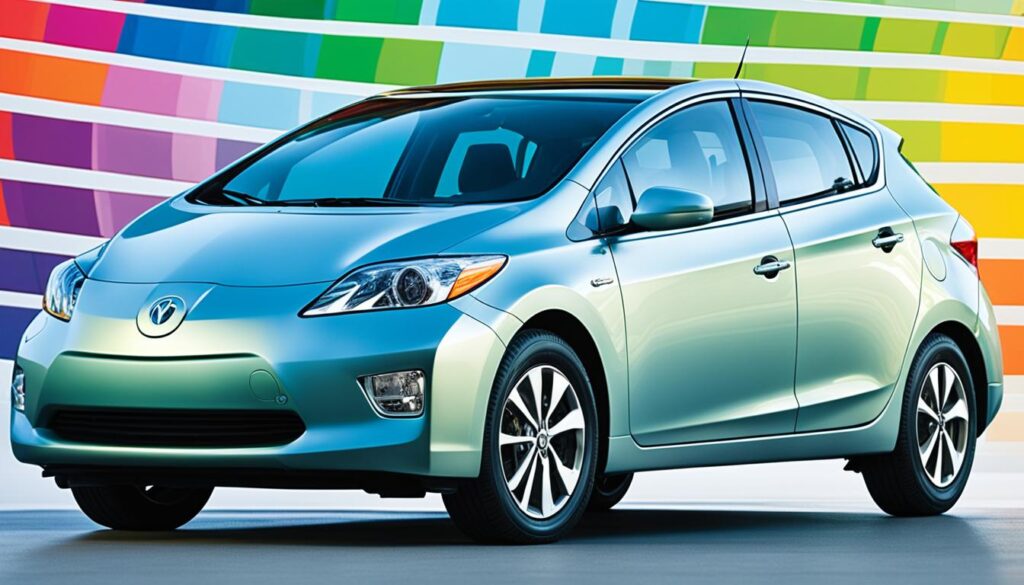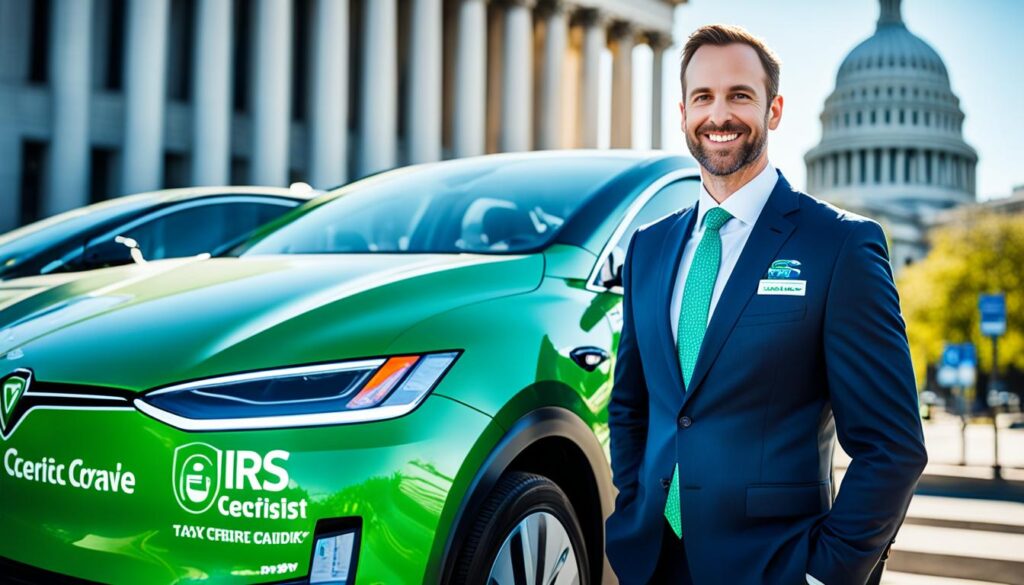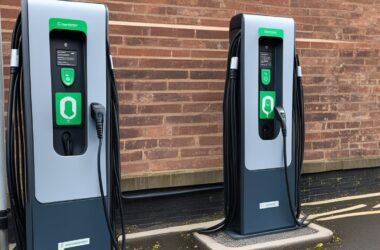As eco-consciousness grows, more individuals and businesses in the United Kingdom are looking to reduce their carbon footprint by switching to hybrid cars. Not only do these vehicles contribute to a cleaner environment, but they also offer attractive tax benefits and credits. In this article, I will explain how hybrid car tax incentives can help you save money and make eco-friendly driving more affordable.
Hybrid car tax benefits come in various forms, including tax credits, deductions, and incentives. These options are provided by the UK government to encourage the adoption of electric and plug-in hybrid vehicles. By taking advantage of these benefits, you not only contribute to a greener future but also reduce your overall tax liability.
Key Takeaways:
- Hybrid car tax benefits can help reduce the overall tax liability for individuals and businesses.
- Tax relief options include lease rental restriction, capital allowance, and annual investment allowance.
- Lease rental restriction applies differently based on the CO2 emissions of the hybrid car.
- Capital allowance allows companies to claim tax relief when purchasing hybrid cars as fixed assets.
- Annual investment allowance provides a 100% allowance for qualifying expenditure, subject to specific rules.
Lease Rental Restriction for Hybrid Cars
Lease rental restriction is a significant consideration when acquiring hybrid cars through a lease or contract hire. The UK government has specific regulations regarding the tax relief available based on the CO2 emissions of hybrid vehicles. Understanding these restrictions can help individuals and businesses make informed decisions when leasing hybrid cars.
For hybrid cars with CO2 emissions of 50g/km or less, the full amount of the finance element of the lease rental attracts tax relief. This means that individuals and businesses can benefit from hybrid car tax relief on their lease payments, reducing the overall tax liability.
However, for hybrid cars with CO2 emissions above 50g/km, there is a flat-rate reduction of 15% in the value of the lease rentals eligible for corporation tax relief. This restriction aims to incentivize the adoption of low-emission vehicles by reducing tax relief for leased cars with higher CO2 emissions. As a result, hybrid cars with higher emissions may have reduced tax relief, making them more expensive to provide.
It’s essential to consider the CO2 emissions of hybrid cars when choosing a vehicle for lease. By opting for hybrid cars with lower emissions, individuals and businesses can maximize the tax relief available and minimize their tax burden. This not only supports eco-friendly driving but also helps to reduce the overall carbon footprint.
“Choosing a hybrid car with low CO2 emissions is not only environmentally responsible but also financially beneficial, thanks to the lease rental restriction for hybrid cars.”
To illustrate the lease rental restriction in a more visually engaging way, the table below provides a comparison of tax relief for hybrid cars with different CO2 emissions:
| CO2 Emissions (g/km) | Tax Relief |
|---|---|
| 50g/km or less | Full amount of the finance element of the lease rental |
| Above 50g/km | 15% reduction in the value of the lease rentals eligible for corporation tax relief |
Capital Allowance for Hybrid Cars
When a company purchases a hybrid car as a fixed asset, it can claim tax relief through capital allowance. The specific allowance depends on the CO2 emissions of the hybrid car. For fully electric cars, a 100% first-year allowance is applicable. For hybrid cars that produce 1-50g/km of CO2, a main pool allowance of 18% is available, and for hybrid cars that produce more than 50g/km of CO2, a special rate pool allowance of 6% can be claimed.
| CO2 Emissions | Capital Allowance |
|---|---|
| 0g/km | 100% first-year allowance |
| 1-50g/km | Main pool allowance of 18% |
| More than 50g/km | Special rate pool allowance of 6% |
Claiming a first-year allowance for fully electric cars allows companies to deduct the entire cost of the vehicle from their profits before tax. This provides a significant tax relief for businesses investing in electric vehicles and encourages the adoption of eco-friendly transportation options. For hybrid cars with lower CO2 emissions, the main pool allowance still offers a considerable tax benefit, while the special rate pool allowance applies to hybrid cars with higher emissions.
By providing capital allowance for hybrid cars, the UK government aims to incentivize companies to transition to greener transportation options, reducing carbon emissions and promoting sustainability.

Example of Tax Relief Calculation:
Company XYZ purchases a hybrid car with CO2 emissions of 30g/km. The total cost of the vehicle is £20,000. Let’s calculate the capital allowance:
- Main pool allowance (18%): £20,000 x 18% = £3,600
Company XYZ is eligible for a capital allowance of £3,600 for the hybrid car.
Annual Investment Allowance for Hybrid Cars
The annual investment allowance (AIA) is a valuable tax relief that businesses can claim to reduce their tax liability on qualifying expenditure. While there are special rules regarding cars, hybrid cars used for commercial purposes may still be eligible for this allowance.
As of January 2021, the maximum AIA has been reduced from £1 million to £200,000. This means that businesses can claim a maximum of £200,000 as tax relief on qualifying expenditure within a given accounting period.
Hybrid Car Annual Investment Allowance
Hybrid cars used for commercial purposes, such as commercial vehicles or those licensed for goods transportation, may qualify for the AIA. When purchasing or leasing a hybrid car for business use, it’s important to consult with a tax professional or accountant to determine the eligibility for the AIA.
The AIA can provide significant tax savings, allowing businesses to invest in hybrid cars while enjoying the benefits of reduced tax liabilities. By investing in commercial hybrid vehicles, businesses can contribute to a greener environment while optimizing their tax positions.
It’s crucial to keep in mind that the AIA is subject to change and it’s important to stay updated on the latest regulations and qualifying conditions for hybrid car tax relief. Consulting with a tax advisor can help businesses take full advantage of the available tax incentives and make informed financial decisions.
Electric Car Tax Benefits
Electric cars offer a range of tax benefits in the UK that make them an attractive option for environmentally conscious drivers. These benefits include exemptions from road tax, congestion charges, and the ability to claim capital allowance. However, it’s important to note that changes to the road tax exemption will come into effect from April 2025.
Currently, electric car owners enjoy a road tax exemption, meaning they don’t have to pay vehicle excise duty (VED). This exemption is based on the car’s CO2 emissions, and electric cars are generally considered to have zero emissions, making them exempt from this particular tax. However, starting from April 2025, all electric cars will be subject to VED, and the road tax exemption will no longer apply.
Additionally, electric car owners benefit from an exemption from congestion charges in Clean-Air Zones (CAZ). Cities such as London, Birmingham, and Oxford have implemented these zones to improve air quality, and electric cars are granted an exemption from paying the associated charges when entering these zones. It’s important to note that the congestion charge exemption for electric cars in London is set to end in 2025, so it’s advisable to stay informed about any changes or updates to this policy.
Furthermore, electric car owners can also take advantage of the capital allowance, which is a tax relief on the purchase of the vehicle. This allowance allows businesses to deduct the cost of the electric car from their profits before calculating their tax liability. It’s worth noting that hybrid cars no longer qualify for the same capital allowance benefits, as this regulation changed in April 2021.
Summary of Electric Car Tax Benefits:
- Exemption from road tax (until April 2025)
- Exemption from congestion charges in Clean-Air Zones
- Ability to claim capital allowance on the purchase of electric cars
Electric car tax benefits provide a significant financial incentive for individuals and businesses to choose eco-friendly transportation options. Whether it’s the savings on road tax, the exemption from congestion charges, or the capital allowance, these benefits make electric cars an appealing choice for drivers looking to reduce their environmental impact and save on taxes.

Electric Car Road Tax Exemption
One of the significant tax benefits of electric cars is the road tax exemption. Electric cars are currently exempt from paying vehicle excise duty (VED), based on their CO2 emissions. However, starting from April 2025, electric cars will be subject to VED and will be taxed the same as petrol, diesel, and hybrid cars.
Additionally, since April 2020, electric cars are also exempt from the road tax surcharge applicable to cars over £40,000 and registered after 1st April 2017. This means that electric car owners can enjoy both the road tax exemption and exemption from the surcharge.
Electric cars have zero tailpipe emissions, which makes them environmentally friendly and helps reduce CO2 emissions. By exempting electric cars from road tax, the UK government encourages the adoption of clean and sustainable transportation options.
It’s important to take advantage of the current road tax exemption for electric cars while it lasts. With the exemption set to end in 2025, it’s a prime time to make the switch to an electric vehicle and enjoy the tax benefits it offers.
| Tax Benefit | Current Status | Effective From April 2025 |
|---|---|---|
| Vehicle Excise Duty (VED) | Exempt for electric cars | Subject to VED like petrol, diesel, and hybrid cars |
| Road Tax Surcharge | Exempt for electric cars | Exempt for electric cars |
Table showcasing the current and future tax status of electric cars regarding vehicle excise duty and road tax surcharge.
Congestion Charge Exemption for Electric Cars
Electric cars provide numerous benefits, including exemption from paying congestion charges when entering Clean-Air Zones (CAZ) in cities like London, Birmingham, and Oxford. This exemption allows electric car owners to navigate through these city centers without incurring any charges, making electric vehicles an attractive option for urban dwellers. The Clean-Air Zones aim to improve air quality by reducing emissions and promoting sustainable transportation alternatives.
It’s important to note that while electric cars currently enjoy congestion charge exemption in London, this advantage will come to an end in 2025. As the government aims to expand the adoption of electric vehicles and further incentivize cleaner transportation, changes to congestion charge policies are to be expected. Therefore, electric car owners should stay informed about the evolving regulations regarding congestion charges and plan accordingly.
| City | Congestion Charge Exemption |
|---|---|
| London | No congestion charge for electric cars (until 2025) |
| Birmingham | No congestion charge for electric cars |
| Oxford | No congestion charge for electric cars |
Electric car owners need to be aware of the specific guidelines and requirements for accessing the congestion charge exemption in each Clean-Air Zone. By taking advantage of this exemption, electric car drivers can save significant amounts of money while contributing to cleaner air and a more sustainable future.
Capital Allowance for Company Electric Cars
Businesses using company electric cars can benefit from 100% first-year capital allowances. This means that they can deduct the entire expenditure for the electric car from their profits before tax.
Previously, hybrid cars were also eligible for this benefit. However, following the regulation change in April 2021, only fully electric cars qualify for the 100% capital allowance. Hybrid cars no longer meet the criteria for this tax relief.
This change encourages businesses to prioritize fully electric vehicles, supporting the transition to a more sustainable transportation system. By offering significant tax incentives, the government aims to incentivize companies to invest in electric cars, reducing their carbon footprint and contributing to a cleaner environment.
| Type of Car | Capital Allowance |
|---|---|
| Fully Electric Cars | 100% first-year capital allowances |
| Hybrid Cars | No longer eligible for capital allowances |
Switching to electric company cars not only offers tax benefits but also demonstrates a commitment to sustainability, attracting environmentally conscious customers and employees. With the increasing availability of electric vehicles and the ongoing development of charging infrastructure, the adoption of electric company cars is an excellent choice for businesses looking to embrace greener transportation options.
Advantages of Electric Company Cars:
- Lower operating costs due to reduced fuel expenses
- Lower maintenance costs as electric cars require fewer regular services
- Enhanced corporate social responsibility by reducing carbon emissions
- Potential brand reputation improvement as a sustainable and forward-thinking company
- Access to low-emission zones and areas with restricted access for internal combustion engine vehicles
By capitalizing on the first-year capital allowances for electric cars, businesses can enjoy substantial cost savings while contributing to a more sustainable future.
Conclusion
In conclusion, the UK government provides tax relief options and benefits to promote and encourage eco-friendly driving. Both hybrid car owners and electric car owners, as well as businesses, can take advantage of these incentives to reduce their tax liability and contribute to a sustainable future. By choosing a hybrid or electric car, individuals and organizations can not only save money on taxes but also play a part in reducing carbon emissions and protecting the environment.
It is essential for hybrid and electric car owners to stay informed about any updates or changes in the regulations regarding tax benefits. This knowledge will enable them to make informed decisions and maximize their tax relief. By staying up-to-date with the latest information, individuals and businesses can continue to reap the benefits of tax relief for eco-friendly driving.
So, whether you own a hybrid car or an electric car, remember to capitalize on the hybrid car tax benefits and electric car tax benefits offered by the government. Together, we can drive towards a greener and cleaner future while enjoying the financial advantages of reducing our tax burden.











проститутки нижнего новгорода
индивидуалки
проститутки иркутска с аналом
индивидуалки иркутск
девушки по вызову в иркутске
бляди иркутска
1xbet new account
https://rajabets-in-india.com/
https://runpost.com.in/discover-the-ultimate-betting-experience-with-the-1xbet-app/
In my opinion you commit an error. Write to me in PM, we will discuss.
https://www.thespeedtriple.com/members/roscarpodgoricacom.25620/
https://virtual-local-numbers.com/countries/1240-india-toll-free-numbers.html
buy priligy usa He told them that he was Jesus, and that they were the elect
http://ivbud.com/interesting/9240-ventyliatsiia-ta-dymokhid-u-bahatokvartyrnomu-budynku-iak-zabezpechyty-bezpeku-i-dovhovichnist-system